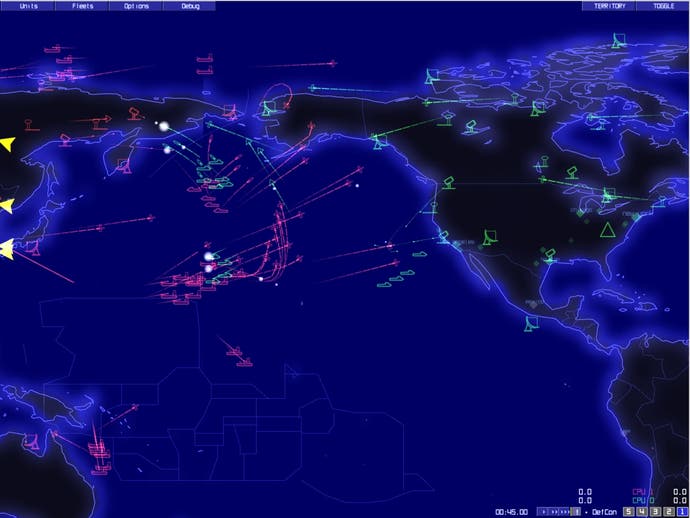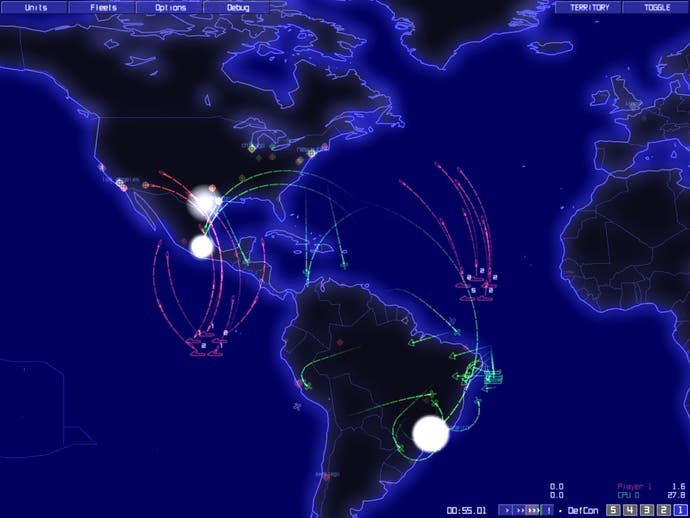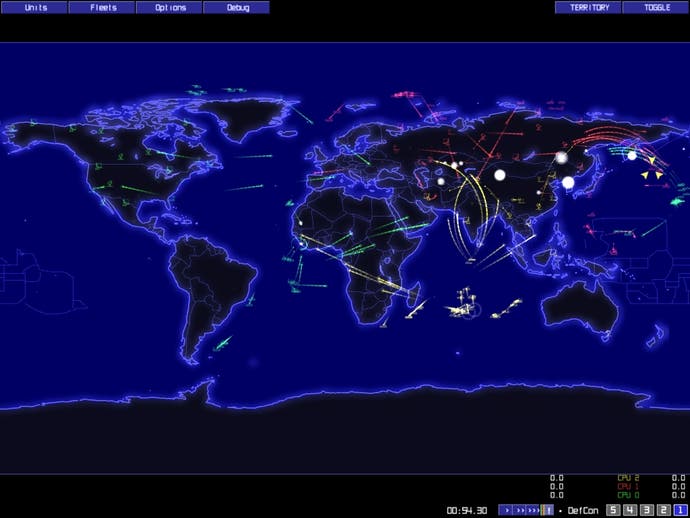Defcon
It's the end of the world as we know it. It feels fine.
Introversion have made it a habit to release brilliant games. This has been constant. What's varied is how easy they have been to explain. So far, they've alternated in terms of how easy it is to grasp them. First, Uplink, which was a hacker sim. Easy. Second came Darwinia, which is, depending on your inclination, either an RTS with wonky pathfinding and some substandard graphics or one of the best games of the last twelve months straddling half a dozen genres and a worthy subject for beat-poetry. Defcon, Introversion's recently announced new game, is a return to Uplink's tradition in that it's interesting but immediately graspable.
What is it? It's That Bit In Wargames, You Know After The Machine Plays Tic-Tac-Toe With Itself When Old-Skool Graphics Of Nuclear Armageddon Flash Forth And Phrases Like Turkish Thrust Are Emblazoned Across The Screen And The World Ends One Hundred Times A Second Until The Computer Realises That War Is Bad And No-one Can Win But Hell! At Least It Looks Good, Oh Yeah, That Bit... but a game.
Essentially, it's a real-time tactical game charting a nuclear falling out between the world's superpowers, a multiplayer game with a multibillion death-count. Silos sit waiting, either able to discharge their missiles or act as anti-missile fire... but not simultaneously, with a delay between switching between one sort and another. Submarines inch closer to an unsuspecting coastline, cutting down the reaction time for the opposing, arrogant superpower to react. Fleets circle the surface, sonar trying to locate subs for depth charges. And in the end, megadeath, nuclear armadgeddon.
In Nuclear War, no-one wins. But maybe - just maybe - you can lose the least.
We bounced e-mails with the effusive Chris Delay, the prime creative force at Introversion, to see what their plans are for making Doomsday as pleasant for us all as possible.
The game simulates Global Thermonuclear War.
Points are scored by successfully nuking the enemy civilian population into oblivion. This is an extremely difficult task because launching an attack on the enemy makes you very vulnerable - Ground Silos and Subs and Bombers all give away their positions the moment they launch nuclear weapons.
We're playing this game every day and people keep coming up with new strategies - but the bottom line is it's very difficult to win convincingly. Games often end with both sides obliterated. It's a fascinating and nervous game to play.
We've gone for a very minimal atmosphere, with some wonderful ambient music playing (written by Alistair Lindsay and Michael Maidment - the same guys that did the awesome Darwinia audio). There's very little in-game sound except deep rumbles when nukes hit. It's like you're ten miles underground in a bunker, bringing the world to an end one city at a time, completely detached from the millions of deaths you are causing.

Firstly it's a great movie. It's one of those movies that I loved when I was a child. The hacking elements became one of the big inspirations for Uplink. In fact two of my favourite childhood movies were Wargames and Tron, which probably explains quite a lot.
Watching the movie it dawned on me that there was a really cool game idea in that movie, and that nobody had really attempted it. There are some games which successfully simulate warfare across the world but they tend to be too heavily strategic (e.g. turn-based and stat-heavy). I wanted to see a game that looked like the movie, with vector-lined Soviet subs closing in on your coastline. Most of all I wanted to recreate that tension and paranoia.
Both, I think.
Defcon is more tactical and less arcade-like than Missile Command, and of course you are playing the attacker as well as the defender. But in Defcon you never personally shoot down incoming missiles - you don't aim the guns yourself.
Actually Defcon is based on the same multiplayer architecture as Darwinia. Although Darwinia is a single-player game its actually running a multiplayer style server-client system behind the scenes, and it was originally intended to be multiplayer only. Someday we might create Multiwinia, but for now we are using the same system to provide multiplayer to Defcon.
Defcon has been a considerably shorter project to build than Darwinia - around six months so far compared to three years with Darwinia. It's a simpler and purer game in almost every sense. After Darwinia I think we all wanted a more controlled game design method.
Defcon was started during Darwinia's development, actually as far back as 2003. I was bored with Darwinia and started messing around with this idea for a Wargames-inspired game. The networking is totally stolen from Darwinia but almost eveyrthing else is new - i.e. the graphics system shares very little code with Darwinia.
We are re-using the sound engine we developed for Darwinia plus a load of basic library code. Each time we make a game it gets easier, but I doubt we'll ever have our own "graphics engine" - the rendering methods for Uplink/Darwinia/Defcon are all so radically different from each other.

Regardless of Darwinia's success or not, Defcon was always going to be the third game. We already had a working prototype (developed by me in just seven days) which had the networking and visual style and basic gameplay already working. That said, it's very nice to be working on something much more controlled than Darwinia. We actually know where we are going with this game.
Content. Is. Bad.
Specifically, content is bad if you're a small team. Even with Darwinia's retro look and feel it took months to make all the custom content - almost every level had something special on it that wasn't on any other level. The second demo level we made took us over four months! For just one level with about an hour's gameplay.
Defcon is a wonderful project because it's almost entirely "content free". The world map continent data is publicly available, the world's major cities are all well known, the icons are simple, there's no custom level designs or cut-scenes or dialog or anything - its just a pure game. The only serious content we are producing is the music.
Yeah, we're very excited by Office Mode. The basic idea is that a group of work-mates can start the game up in the morning in Office Mode, playing over their local area network. The game takes place entirely in real-time (you can quite easily end the world with nuclear conflict in eight hours) and each player controls one territory, e.g. North America or Russia. You can hit the Panic key (press escape twice) which immediately removes the game from the screen and places a discreet icon in your system tray. That icon changes when important things happen - for example if you detect some nuclear launches the icon will flash as a Nuke for a few seconds. Because everything is taking place in real-time you've got at least 30 minutes before those nukes land, so you've got plenty of time to respond without interfering with your real work too much.
Standard games typically take 30-40 minutes to play out. In a standard game you can set the game-speed - anywhere from real-time up to 20x real-time. In multiplayer the game runs at the slowest requested speed.
We also start the game at Defcon 5, and bring it down every few minutes to 4, 3, 2, eventually to 1. At each stage the player's options increase - e.g. you can only fire nukes in Defcon 1. You can only engage the enemy in Defcon 3 or higher, you can only go into enemy territory in 4 upwards etc. We did this to allow for a slow build up to the game, rather than a clickfest in the first few minutes. Defcon is a thinking man's game, so we don't want to give any serious advantages to the person who can click the quickest.

We're also building a fairly complex Alliances system. If six players fight each other it tends to end up a shambles, so we're permitting players to form alliances and play (say) three versus three. Each individual player is still playing to win - their score is independent of their alliance's progress, and players can betray their alliances and switch to the opponent's teams if they choose to and are able to convince the enemy to permit it. (This is determined by a vote of all the players in the destination alliance). We're predicting its going to get quite ugly, with players attempting to line up the perfect attack on a team-mate before betraying them and striking at a key moment. There's going to be a lot of paranoia in alliance games. We've got in-game IRC between players (public and private) and we've noticed lots of "wheeling and dealing" in the games we've played, with players desperately trying to secure their alliances.
We've seen alliance members shooting overhead friendly planes down because they believed the planes were scouting the area for targets in preparation for a strike. This results in arguments in the chat channels, followed by skirmishes at sea, followed by retaliation, before finally the whole alliance collapses and everyone starts nuking the hell out of each other. It's awesome.
Every unit in-game has some radar coverage in a circle around it. Some units (e.g. Radar stations) have longer-range radar than others. You can only see enemy units if they are on your Radar. Once a stationary object has been seen by your radar it will remain on your screen as a "ghost", since you know its there from that point on. Hence a common tactic is to fly aircraft over enemy territory hoping to spot enemy silos and radars. If you can spot the enemy Radars and take them out early it makes the remainder of your attack considerably easier, because their AA guns get far less warning of you coming.
Some units don't show up on your radar - e.g. Subs or Bombers in stealth mode. Subs can be detected by putting your sea vessels into Sonar mode, so long as you are near enough. Subs can themselves go into Sonar mode (to seak other subs) but it lights up their position on the enemies radar. You can view your own radar at any time in-game.
It's worth mentioning that alliances and betrayals are all options that can be disabled when the game is starting up, if you fancy a slightly more friendly game of global nuclear war.
We're providing a Defcon computer player - effectively a bot. You can include as many of them as you like in the games you are setting up. So you could play a normal game of Defcon against (say) three enemy computer players.
The single-player also contains a tutorial for learning the game, with computer players as the enemy. But Defcon is pretty easy to learn to play - just very hard to win.
We're currently estimating it will be finished in April.








